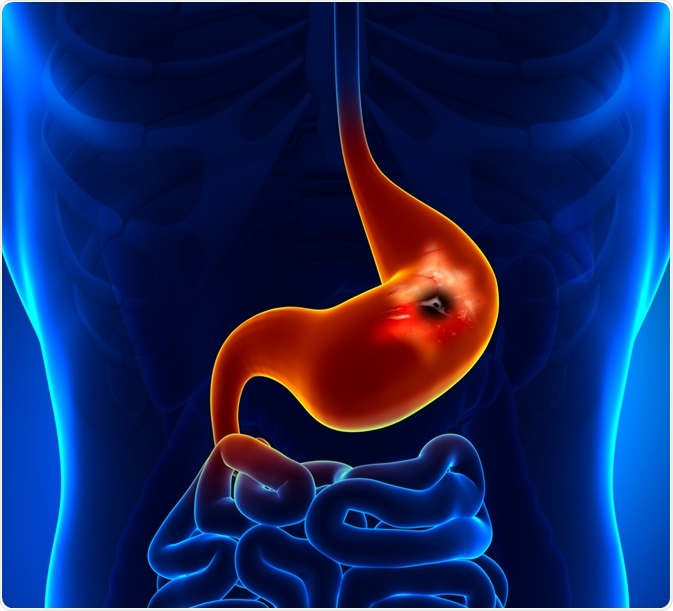A peptic ulcer is an open sore in the lining of the esophagus, stomach, or duodenum, which is the upper portion of the small intestine that connects to the stomach.
Epithelial cells lining the inner stomach wall secrete acids that are used for food digestion. The stomach and duodenum protect themselves from the strong acids using a thick layer of mucous that covers the inner epithelial lining. Irritations or areas of inflammation that break down this protective mucous layer can allow stomach acid to reach the inner lining of cells and cause damage.
Patients with peptic ulcers typically experience abdominal pain as the digestive acid eats away at the underlying cells. Stomach pain is sometimes accompanied by slow, chronic bleeding into the gastrointestinal tract or in severe cases, acute bleeding into the abdominal cavity.
 Image Credit: decade3d - anatomy online / Shutterstock.com
Image Credit: decade3d - anatomy online / Shutterstock.com
Causes of peptic ulcers
Up until the 1980s, clinicians thought peptic ulcers were caused by a diet rich in spicy and fat-laden foods or by high levels of emotional or physical stress. It is now known, however, that the leading cause of peptic ulcers is infection with the Helicobacter pylori bacteria.
H. pylori is a gram-negative, spiral-shaped bacterium that is found embedded in the mucous layer or inner lining of epithelial cells that cover the stomach, duodenum, and esophagus. In order to survive in the acidic stomach environment, H. pylori secrete urease, an enzyme that breaks down urea into ammonia and carbon dioxide, which neutralizes stomach acid and damages the protective gastric mucous layer.
H. pylori infection also triggers an immune response that causes inflammation and further exacerbates the irritated area, creating an open sore. H. pylori infection is responsible for 80% of gastric ulcers and 90% of duodenal ulcers and is also the infectious agent that causes gastritis. Long-term H. pylori infection can result in gastric cancer or mucosal-associated-lymphoid-type (MALT) lymphoma.
H. pylori is spread from person to person through oral-oral or fecal-oral routes of transmission. In developing countries, H. pylori bacteria can be spread through contaminated sources of drinking water. Over two-thirds of the world population is infected with H. pylori, although most people who are infected will not experience symptoms of peptic ulcer or develop cancer.
A secondary cause of peptic ulcers is the long-term use of non-steroidal anti-inflammatory drugs (NSAIDs). NSAIDs include prescription and over-the-counter medications used to reduce inflammation, manage pain, and control fever, such as ibuprofen, aspirin, naproxen, ketoprofen, and some arthritis drugs.
Overuse of these drugs can irritate and damage the inner lining of the stomach, resulting in peptic ulcers. Patients needing these types of medications are often advised by their doctors to take the medication with food to protect the stomach lining or to switch to acetaminophen, which does not cause stomach irritation.
Alcohol, coffee, and smoking can also irritate the stomach lining and result in a peptic ulcer. Patients with ulcers should avoid these substances. Although spicy foods do not cause ulcers directly, they may exacerbate an existing lesion.
Peptic ulcer disease - causes, symptoms, diagnosis, treatment, pathology
Prevention of peptic ulcers
Since the exact mode of bacterial transmission is unknown, it is recommended that all people thoroughly wash hands frequently, wash vegetables and other foods, and drink from clean water sources, if possible. Government and nonprofit agencies such as the Centers for Disease Control and Prevention in the United States and the World Gastroenterology Organisation are studying routes of bacterial transmission and investigating ways to prevent infection in order to minimize the impact of H. pylori, especially in developing countries where high infection rates are a serious public health issue.
References
Further Reading
Last Updated: Jul 20, 2023